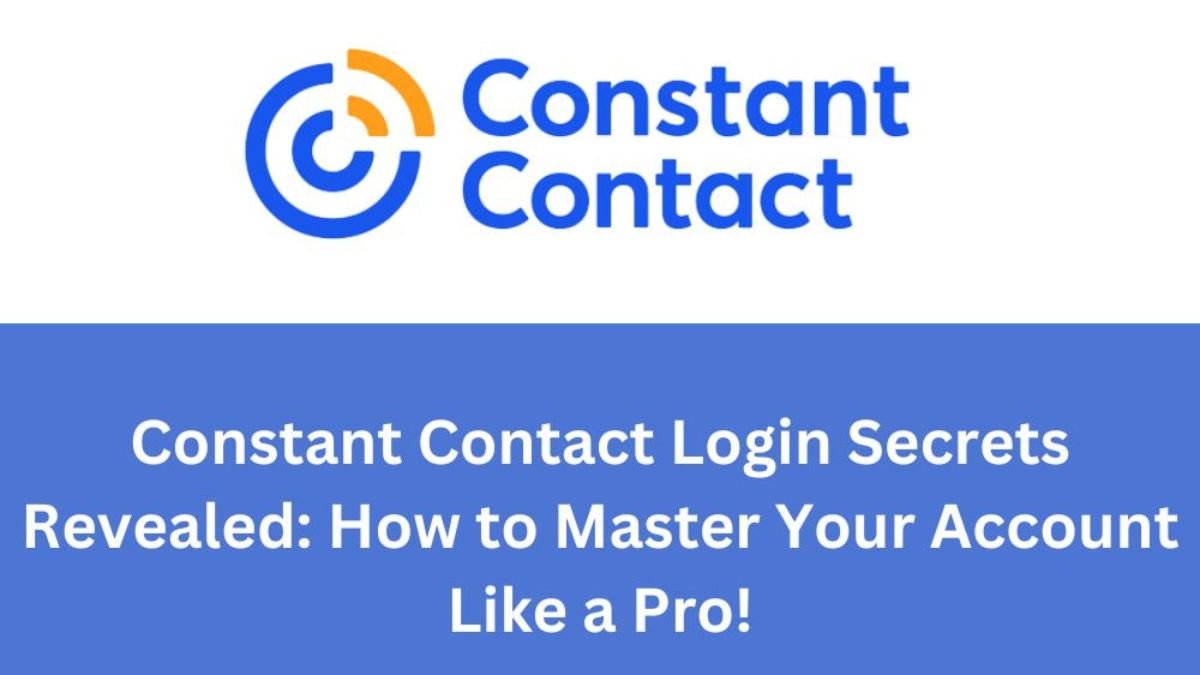In this article, learn about the constant contact login secrets revealed: How to Master Your Account Like a Pro!
Table of Contents
ToggleIn this post, we’ll tell you how to keep your account safe from internet risks. Keeping those login details secure is extremely important. Nowadays, we use Constant Contact a lot for items such as sharing information, organizing meet-ups, and discussing with people. And we’re going to share the details on smart and well-thought-out ways and clever tricks to do exactly that; these methods are inherently, or in substance, similar to wise moves and practical tips.
The Importance of Constant Contact Login
Logging into Constant Contact is crucial for various reasons:
- Account Access: Users can go into their accounts at Constant Contact to successfully deal with their email blasts. With a safe, easy setup, they can craft, send, and watch their marketing messages. We can take as a definite certainty that connecting and controlling email marketing campaigns on Constant Contact is a thing.
- Campaign Management:When you log into Constant Contact, it’s extremely easy to get your email marketing material done. You can make your own email designs, decide when to send them out, watch how well your projects are doing, and organize your contact lists. It helps you to uncloak the details about running an email campaign.
- Contact management: When you log into Constant Contact, you can make your contacts very neat and tidy. You can divide your contacts into groups any way you like, switch their places, and even make sure all their information is current. It may seem hard to believe but we can take comfort in how easy it makes managing everyone’s details.
- Analytics and tracking:By logging in to Constant Contact, users get this great tool where they can track all kinds of characteristics about their messages such as how many people open them, how many click on items inside them, if any messages bounced back, and more content like that. This truly aids them understand if what they’re doing with their tools is working or not. There can possibly be gratification in your knowing that, based on this data, they can figure out how to do better in their future marketing approach.
- Integration and Automation: To get things sorted with your marketing and make some tasks run on autopilot, Constant Contact connects with several other programs and tools you might use, such as places where you sell items online, or keep customer data. Just log in and you can start mixing everything together; this way, the perfect result of this is that everything in your marketing tool kit works together extremely smoothly.
- Support and Resources: When you get into Constant Contact, you’ll find material that might help you and a significant quotient of things to learn. If you need help, you can speak to the customer service team, or, in a very basic essence, read guides, tutorials, and the knowledge base to get the complete picture on how to pass email marketing; there’s a substantial amount of support and resources waiting for you.
To really understand all the marvelous items Constant Contact offers…such as being able to see and check how things are going, make great email advertisements, manage your contacts, and even get help whenever you need it…you must log into it. A discerning reader, such as yourself, will surely comprehend how important it is to sign in to take advantage of everything.
Utilizing Password Managers in Constant Contact Login
Your Constant Contact login may be made much more secure and convenient by using password managers.
Password managers may be useful in the following ways:
- Strong and Unique Passwords:For every single one of your online spots where you sign in, such as Constant Contact, password managers are here to assist. They come up with strong, stand-out passwords for each site and keep track of them for you. This is really good because the passwords they make are tough and fraught for any hacker to figure out. All your passwords get stored safely in the password manager, which is wonderful because it means you don’t have to worry about remembering them. A discerning reader may begin to register that having different complicated passwords for each account is not only wise but sort of essential.
- Auto-Fill Functionality: Password managers can fill in your login information for Constant Contact…without any doubt. It saves you so much time and prevents you from having to type it all in over and over. One can see this remove the chance of blundering typing your data and not being able to log in.
- Secure Storage: Password managers are extremely helpful because they store all your sign-in details but keep everything very safe with encryption. This makes sure no one can just come in and take your data. And get ready, because, in what you might think is stark contrast, they even include some extra items to lock it down even more—like needing another step to prove it’s really you, or using your fingerprint.
- Cross-Platform Accessibility: Closing out this document, I endeavor to elucidate how easy it is to log into Constant Contact from anywhere because you have password managers. Whether you’re on your phone, computer, or using some other gadget, as long as your password manager is set up there, you’re prepared. Password managers work with all kinds of technology items – such as your web browser or mobile device – making sure you can always get into your account without a hitch.
- Generator of Passwords: Your Constant Contact account is extremely secure because there’s a feature in password managers that can create passwords for you. No matter how long or complex you want your password, this tool can help you. But or more appropriately, nevertheless it simply links you with a strong, random password to keep things locked down tight.
- Secure Sharing: If you need to get your team members or coworkers into Constant Contact for group email content, password managers let you share login data securely. It’s very useful because there might be satisfaction in your knowing that everyone can get in without any trouble.
I believe, as you might hold credence also, that keeping the newest version of your password management software is extremely important. Consider frequently changing your passwords and be certain you have a strong master password when setting up for your Constant Contact. Using a password manager the right way matters a lot?
You may streamline the login process, increase the security of your Constant Contact account, and safeguard your priceless email marketing data by using a password manager.
Using Biometric Authentication
To see if Constant Contact has added biometric authentication items, such as fingerprint or face recognition, since September 2021 – when I last checked – you must ask them directly or look through their newest updates. Back when I knew, they didn’t support that way of recognizing people by their physical traits. Just remember, what they offer can change as the undertaking strived to evolve with technology and software through the months and years.
A security method known as biometric authentication uses distinctive physical or behavioral traits, such as fingerprints or facial features, to confirm a person’s identification.
It gives the following advantages:
- Enhanced Security: The whole point is: when it comes to making sure your account stays only for you, the trade changer is the fingerprint or face scan – because only you have your fingerprints and face. It’s hard for someone who isn’t allowed to get into your account to do that. So, with biometric login, everything gets a notch safer; the concrete and clear culmination of this is that logging in is significantly more secure now.
- Convenience and user experienceSo when you use your face or fingerprint to log in, it’s very nice because you don’t have to stress about remembering several complex passwords; the reader is destined to learn that it’s completely about making things easy and ensuring a wonderful method to get into your accounts without the problem.
- Convenience and User Experience: Biometric authentication takes less time than the usual password material. For people who return frequently to their Constant Contact accounts, it’s significantly faster to get logged in; this makes everything run smoother. And, there can possibly be gratification in your knowing that it’s both quick and efficient.
- Quick and Efficient:By using biometrics instead of passwords that people easily forget, steal, or guess, the risk that comes from bad passwords gets smaller. A discerning reader may begin to register how intelligent, and informed, and quick this manner of checking who you are really is, because it makes it so you don’t use passwords very often.
If Constant Contact adds biometric authentication for signing in, people can choose to use it based on what their devices, like phones or tablets, can do. Next we engage in an exacting analysis of how this works.
Always stay updated with the latest security material and the best ways to keep things safe that Constant Contact and other important software individuals tell you about. Doing this keeps your accounts secure and simple to access. And in the final analysis, one finds it’s extremely important to not fall behind on this advice if you want to keep your items protected.
Regularly Updating Passwords
It’s crucial to routinely change your Constant Contact login password in order to keep your account secure.
The following are some essential considerations:
- Frequency: You should change your passwords often, about every three to six months. If you think someone might have hacked into your account or there was a security breach, changing your password might help keep strangers out; this is a good way to show the importance and make sure no one gets in who shouldn’t.
- Strong and Unique Passwords:Make your new password tough and one-of-a-kind. Do not choose passwords that are simple to guess. I consider a solid password to usually have numbers, symbols, and an interesting combination of big and small letters; be careful not to share details that can tell others about you.
- Password Complexity:When you’re making a new password, you need to use new and different options with letters, numbers, and some weird signs. Make sure it’s not too short, aim for at least 8 characters. Pay attention, you must obey whatever rules the school has for passwords, because they are very serious about what they allow. You may be a tad disbelieving that sticking to many rules makes a difference but doing it helps keep your account safe.
- Avoid Reusing Passwords: You must mix up your passwords for all your different accounts and especially for your Constant Contact account, even if that might seem much in the area. Going with the same password everywhere just enhances the chances of someone figuring it out and then they could get into many of your things.
- Two-Factor Authentication (2FA): Turning on Two-Factor Authentication for your Constant Contact account might be something you are thinking about. By asking for both your password and another verification step, such as a code sent to your phone or using an authentication app, 2FA adds a stronger shield for your account; there is a profound and deep-seated certainty that, should your password get cracked, this method puts up another wall against any unauthorized snooping.
- Password Manager: You can use a password manager to come up with and safely keep very secure passwords; this means you won’t have to remember the difficult passwords for every location you go online, such as Constant Contact. A discerning reader may begin to register how handy password managers can be.
- Be Wary of Phishing Attempts:Watch out for sneaky tricks that want to make you give up your login details. It might not be obvious but real companies, including Constant Contact, won’t ever ask for your password through email or anything that’s not safe. Before you think about sharing any of your private data, double-check to see if the email or link looks questionable or genuine. It may seem hard to believe but we can take comfort in the fact that not all messages asking for personal items are legitimate. Always be careful.Be Wary of Phishing Attempts:
If you want to keep your Constant Contact material safe, your email campaigns protected, and make sure no one changes your subscriber’s data, it’s an intelligent and informed move to change your password frequently. Doing this the way experts suggest is the concrete and clear culmination of this.

























